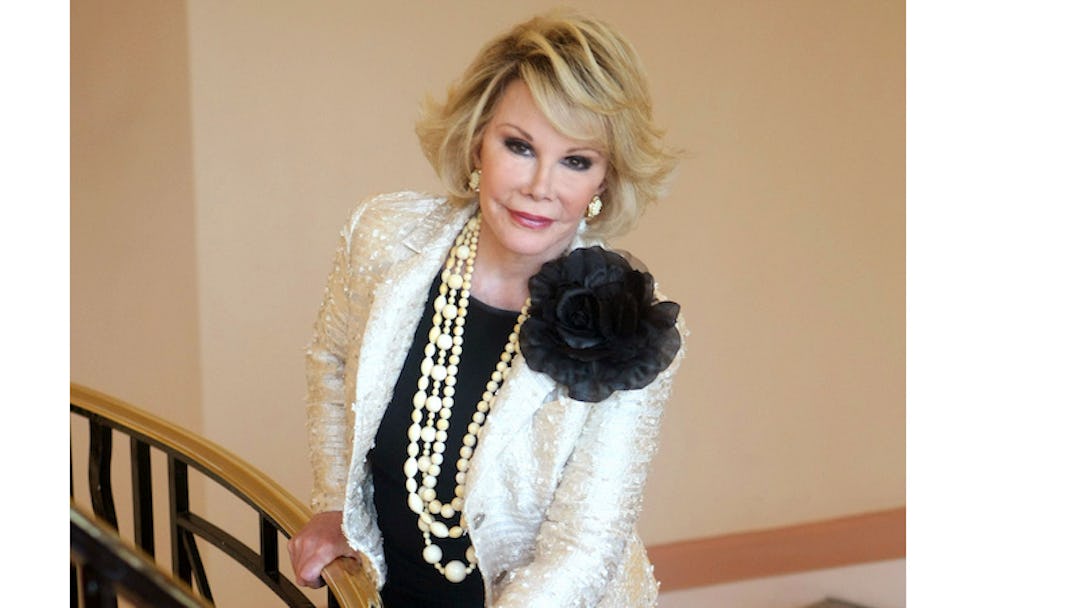Joan Rivers died yesterday at 81, after complications from surgery. She was a legendary comedian with a 50-year-career that started in dank Greenwich village clubs and hit its peak with Rivers’ appearances on The Ed Sullivan Show, regular guest-hosting gig on the Johnny Carson-era Tonight Show, and, in 1986, her own late-night show on Fox. The Late Show With Joan Rivers was the first talk show on a major network hosted by a woman.
Children of the ’80s and ’90s remember Rivers somewhat differently. She was a semi-legend who was always there, appearing in things like Muppet movies and Spaceballs, hawking jewelry on QVC, and hosting a daytime show that was something to watch on a sick day. Every line out of her mouth was a joke.
Once the 2000s came along, Rivers continued to perform, and she jumped on the reality TV train, winning Celebrity Apprentice back when we still cared about that show and embarking on a long-term relationship with E!, where she’d do red-carpet commentary and star in several reality shows. It was the point when she started being famous because she was Joan Rivers, “character” — famous for being famous, a girl from Brooklyn dressed up in diamonds and fur, making jokes. This new profile was very, very far away from her early days as a pioneering comedienne. She got mean, lapsing into self-parody, saying whatever came out of her mouth for comedy’s sake.
It can be difficult, especially for younger generations, to remember that, before she was a celebrity, Joan Rivers was one of the first major female comedians in America, at a time when people really did assume that women weren’t funny and couldn’t tell jokes. But Rivers did:
Johnny Carson served as a “mentor” for Rivers, giving her a big break and establishing her as the permanent guest host for The Tonight Show in 1983. When she left for her own late-night show, Carson shunned her publicly, and she had her moment of being down, a showbiz pariah. But she kept going. She would keep going for the rest of her life, and she would have comebacks galore, embodying a certain tenacity in Hollywood that was aggressively unpretty but still somewhat admirable in its own, uniquely American way.
What Rivers had were jokes. So many jokes. Her first topic of comedy was herself, and how she functioned in the world, as a woman railing against the expectations of the times. (She also wrote this insane-sounding TV movie called The Girl Most Likely To…) In the smart, revealing 2010 documentary Joan Rivers: A Piece of Work, she’s still here, working the clubs and telling ribald jokes in her 70s, having moments of real-person vulnerability that we never got to see in her reality shows. She also shows off her file cabinet of jokes. It’s a colossus, touching in its homemade, analog quality.
Rivers was a pioneering figure, especially for women in comedy, and she leaves behind a legacy of being able to make strides purely through being the funniest person in the room. (Comedian Julie Klausner wrote a lovely tribute to working with Rivers that highlights her generosity.) Would we have Sarah Silverman without Rivers? Would we have Amy Schumer? Maybe not.
But her comedy was also complicated — it’s fascinating to see that she was always, always teetering on the lines separating self-parody, self-deprecation, and really offensive, horrible stuff. A Playboy interview from 1986 got at this double-sided legacy in interesting ways. A question about feminism and Rivers’ jokes about women got two replies. First, Rivers made the statement that she was just telling it like it is: all women are objects. Then she had an absurdist thought regarding Margaret Mead:
I’m absolutely a feminist. When I started doing stand-up, I played these strip joints, these dives all over the country. At Barnard, I had taken a class with Margaret Mead. She was so smart — not a dresser, but so smart. [Laughs] She was married three times, so there was obviously something going on under that grass skirt. Anyway, I called her and told her I was going to play these crummy clubs and said, “Maybe we can find something out for women from this.” So she said, “Let’s do a little survey.” She made up a list of questions that I passed out during each of my performances. Then I’d send Mead back the questionnaires with glass marks on them. [Laughs] The questions were “Who do you think should control the income in your family? Who brings in the income? Who stays with the children? Who makes the big decisions? Do you think women should work? Do you think women should have equal say in money investments in the family?” Very basic things. This was the early Sixties. Anyway, when Mead tabulated all the answers, she said, “There’s something happening out there, because ladies in Kansas City are saying, ‘Even though I do work, I don’t think I should tell him how to invest the money — or wait a minute. Maybe I should tell him.’ “
Jokes until the end. Whenever a comedian takes on the risqué and the taboo with absolutely no fear, that’s when we’ll feel Rivers’ real legacy.
